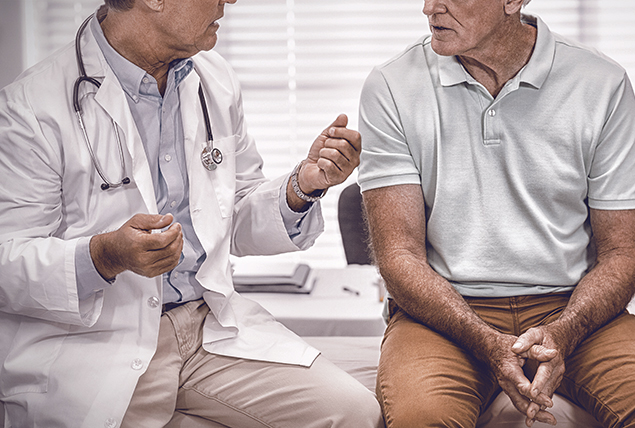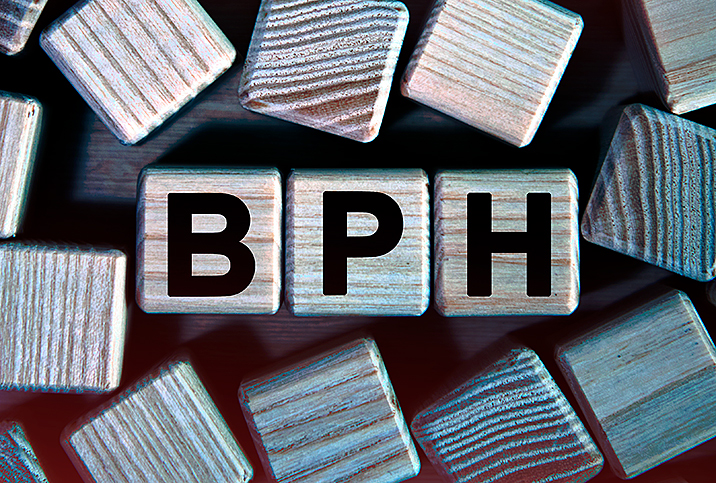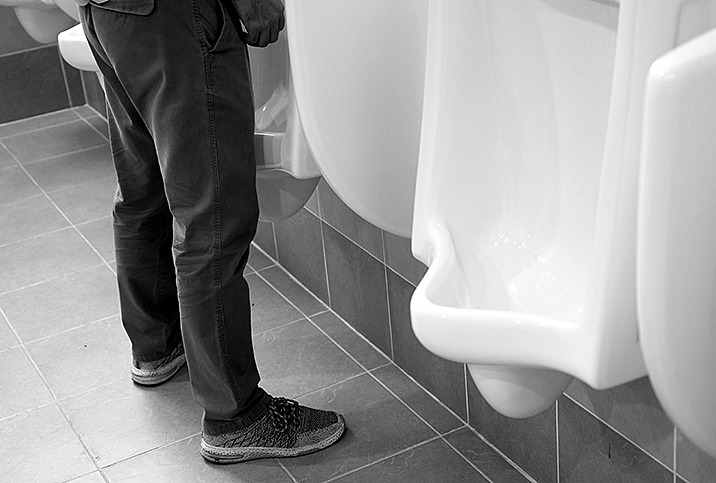What Is BPH and What Causes It?

Benign prostatic hyperplasia (BPH), an enlarged prostate gland, is a condition in which the prostate gland grows significantly; the condition primarily affects older men. BPH is noncancerous but can cause issues with urination, ejaculation and more.
While BPH is noncancerous and typically not life-threatening, it shares symptoms with prostate cancer. The condition can exist at the same time as prostate cancer, so its symptoms shouldn't be ignored or presumed harmless without further evaluation.
Keep reading to learn about BPH and what can cause an enlarged prostate.
What is the prostate gland?
The prostate gland is a tough, walnut-sized organ made up of connective tissues and glandular tissues. It's an internal part of the male reproductive system that sits just below the bladder and in front of the rectum.
Situated near the beginning of the urethral passage at what's called the bladder neck, the prostate gland partially surrounds the urethra, the tube that carries urine from the bladder for expulsion.
The prostate's primary job is to produce seminal fluid, which nurtures and protects sperm cells as they attempt to make their way to an egg for fertilization. It's also partly responsible for the contractions a man feels with ejaculation, as it forces seminal fluid through the ejaculatory ducts and into the urethra.
The gland contributes between 25 percent and 30 percent of the volume of a man's semen, specifically amino acids, enzymes, citrates, fibrinolysin, prostate-specific enzyme (PSA) and zinc.
What is benign prostatic hyperplasia?
Benign prostatic hyperplasia is a noncancerous condition that typically affects older men when the prostate gland grows larger. A healthy prostate gland weighs about 30 grams, or the weight of five U.S. quarters, whereas a prostate enlarged by BPH can weigh up to 100 grams.
Research indicates that having BPH does not increase your chances of prostate cancer. However, since prostate cancer and BPH share symptoms and can both be present simultaneously, it's wise to get checked if you develop any of those symptoms.
American Urological Association (AUA) guidelines state healthcare providers should offer prostate cancer screening to men of normal risk who are between the ages of 50 and 69. If you're in a higher risk group—you're Black or have a close relative who has had prostate cancer—you should consider being screened at a younger age.
The prostate gland undergoes two distinct phases of growth. Early in puberty, the prostate nearly doubles in size and stabilizes for a time. Then, at about age 25, it begins to grow again and continues throughout a man's life.
"Benign prostatic hyperplasia is a normal part of aging," said Neel Parekh, M.D., a men's fertility and sexual health specialist with Cleveland Clinic. "But as the prostate enlarges, you might have a weaker stream, strain to urinate and wake up at night to pee. Those are all slow-onset symptoms; it's usually not acute onset like with prostatitis patients."
All men will experience some growth of their prostate glands as they age. After about age 40, some men's prostate glands continue growing until they are no longer walnut-sized but closer to the size of a lemon. At that point, the gland has grown so large that it likely impinges on the urethra, squeezing the tube closed so that it interferes with urination and ejaculation.
What are the symptoms of BPH?
The first symptoms of BPH that men are likely to notice involve the lower urinary tract. You might experience the following:
- Dribbling or slowness when urinating
- Trouble getting your stream started
- Urinary incontinence (leaking)
- A sudden need to urinate
- Need to get up during the night to urinate
- Never feeling like your bladder is empty
- Pain with ejaculation or when urinating
- A different color to your urine
- A different, stronger odor to your urine
What causes benign prostatic hyperplasia?
The medical community and researchers haven't reached any firm conclusions on what causes BPH. There are many theories, however, surrounding the changes men undergo, especially after age 40, in terms of testosterone production.
It's known, for instance, that men who had their testicles removed before puberty don't develop BPH. We also know men's bodies produce less testosterone as they age. Beginning at about age 30, men's testosterone production naturally declines by about 1 percent per year. At the same time, the amount of estrogen men produce—both genders produce both of the major sex hormones, just at different levels—remains about the same.
The theory goes that hormonal changes may cause prostate tissues to grow.
People who take supplemental testosterone may further muddy the waters and end up with rapidly growing prostate glands. Another hormonal factor may contribute to the growth of the prostate gland. As men get older, they produce higher levels of dihydrotestosterone (DHT), a more potent type of testosterone that may contribute to the enlargement of the gland.
How common is BPH?
Similar to prostate cancer, BPH is much more common in Western countries than in Asia. A recent study may have uncovered a genetic link for BPH in men who are under 65 and have a very enlarged prostate, according to Johns Hopkins.
In the study, the affected men's male relatives were four times more likely to require BPH surgery, and their brothers had a sixfold higher risk of developing the condition.
In the West, BPH is a very common condition; in fact, it's the most common prostate problem for men in that part of the world. If you're a man and you live long enough, it's probable you will develop enlargement in your prostate at some point.
By age 60, about 50 percent of men will have signs of an enlarging prostate, according to Cleveland Clinic. By age 85, about 90 percent of men will have some signs of BPH. The good news is that only about half of men who have BPH will develop symptoms that require treatment.
How to prevent BPH
Unfortunately, direct prevention of BPH isn't really possible. As noted, all men's prostate glands naturally grow larger throughout their lives, and some just grow too large.
However, there are steps you can take to help ensure your prostate gland remains as healthy as possible.
Prostate screening
Regular prostate screenings—when appropriate for your age and risk factors—are paramount to heading off any potential prostate problems before they get worse.
Regular exercise
People who are more physically active are at lower risk of developing BPH.
Healthy diet
Eating a healthy diet with plenty of whole food, fruits, vegetables and an appropriate amount of healthy protein can help with prostate health.
Quit smoking
Tobacco products may increase your chances of developing prostate issues such as BPH and prostate cancer.
Since BPH shares many symptoms with prostate cancer, it's important to get checked and not assume they're harmless. However, if it turns out to be BPH, keep in mind it's a very manageable, common condition.


















